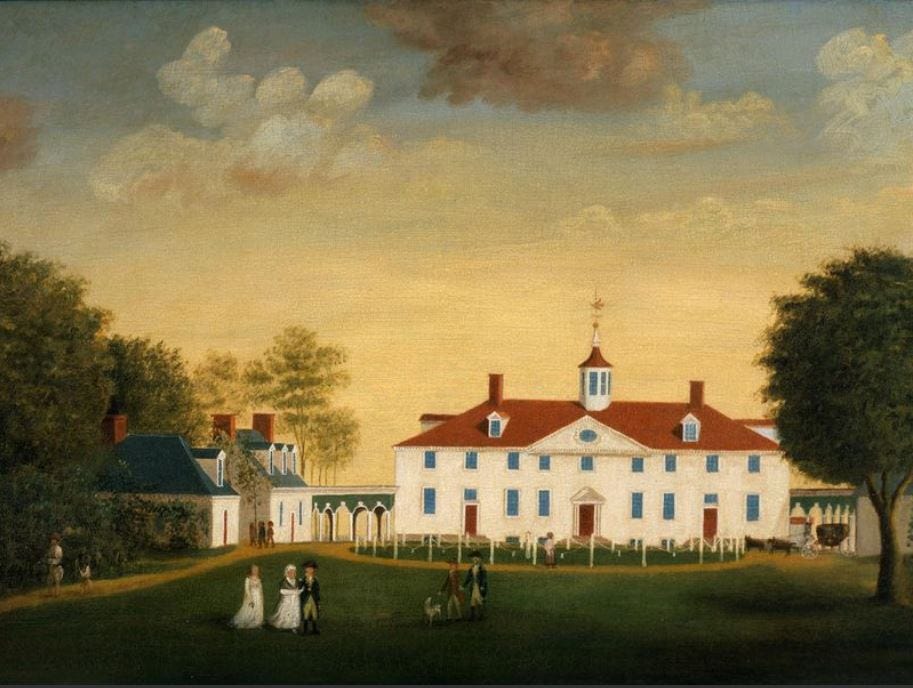TDIH: George Washington's only trip abroad
He caught smallpox and tuberculosis, which was a blessing in disguise.
On this day in 1752, George Washington returns home from a trip to Barbados. That four-month trip would prove to be the one and only time that he traveled abroad.
His experiences changed him forever—and thus left an indelible mark on our country, too.
Washington was then just 19 years old, and he’d been working as a surveyor in Virginia. He made the trip to Barbados only because his half-brother, Lawrence, asked him to go. He was close to his brother, and Lawrence’s health had been deteriorating. It was thought that a trip to a warmer climate would help resolve Lawrence’s constant, racking cough.
The trip was inconvenient, and it would cost Washington at least one season of surveying work. But Washington knew what he had to do. After all, Lawrence was like a second father to him.
The two left for Barbados in September 1751.
“The brothers apparently sailed on the Success, a small trading sloop,” Mount Vernon’s website describes. “The voyage, the only long sea voyage of Washington’s life, took more than six weeks on what George Washington called the ‘fickle & Merciliss Ocean.’”
They arrived in Barbados early in November and apparently enjoyed themselves quite a bit at first. Washington wrote that he was “Genteely receiv’d and agreeably entertain’d,” and that he appreciated the “Hospitality and Genteel behavior” shown to “every gentelman stranger by the gentleman Inhabitants.”
Some of these social interactions likely had a lasting impact, as historian Jack Warren explains.
“George Washington’s encounter with the British military establishment in Barbados seems to have had a crucial impact on his aspirations,” Warren writes. “Before his trip, Washington has little acquaintance with military men or military matters. After returning to Virginia, he dedicated himself to advancement in the military more completely than any of his Virginia contemporaries.”
Either way, Washington was undoubtedly affected by what happened on November 16: He was “strongly attacked with the small Pox,” as he wrote in his diary. Historians and modern doctors believe that the smallpox case was followed by a case of tuberculosis. The smallpox case left Washington with immunity from a disease that would later plague the Continental Army, and the tuberculosis likely left him infertile.
Did his inability to father a son provide another benefit to our country? When he retired from the presidency, there was no biological heir apparent. Any temptation towards a hereditary monarchy was nipped in the bud.
Washington recovered from his illness after about a month. He decided to return home, although Lawrence did not come with him. “This climate has not afforded the relief I expected from it,” Lawrence wrote his father-in-law, “so that I have almost determined to try the Bermudas . . . .”
Lawrence never recovered. Instead, he returned home during the summer of 1752 and passed away shortly thereafter. His only remaining heir, a daughter, passed away two years later. Washington inherited Mount Vernon after the death of Lawrence’s widow.
So many events in such a short period of time, each doing its part to lay the foundation for Washington and the country that needed him.
Sources can always be found on my website, here.





There seems to be no end to the many facets of George Washington. Like every person he was deeply influenced by and developed through his experiences. He was an intelligent man and learned quickly. Still nothing happens by chance. He was surely guided by his faith in God. I enjoy learning more about his life and how he became the very man who was instrumental in forming this nation.
This was certainly a hard time for anyone. It is amazing that Washington survived which is probably due to his physical conditioning from his work and healthy lifestyle. Hard physical work has its benefits. I suspect Washington’s character would not have allowed him to practice political nepotism nor is there evidence of him encouraging relatives to follow his political career. Washington leaves an example of a fallible man of character serving his country without wavering in his principles, character, or goals. How we need more of his ilk today in politics!